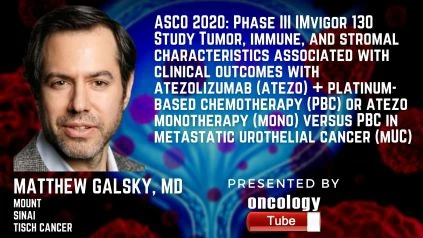Matthew Galsky, MD from Mount Sinai Tisch Cancer discusses an ASCO 2020 abstract entitled Phase III IMvigor 130 Study Tumor, immune, and stromal characteristics associated with clinical outcomes with atezolizumab (atezo) + platinum-based chemotherapy (PBC) or atezo monotherapy (mono) versus PBC in metastatic urothelial cancer (mUC)
Context:
Clinical outcomes with atezo mono in mUC are associated with tumor mutational burden (TMB), PD-L1 expression, T-effector gene expression (GE) and a fibroblast TGF-β-response signature (F-TBRS) (Mariathasan, Nature, 2018). The possible predictive role of these biomarkers and APOBEC mutagenesis in IMvigor130 is discussed here.
Approaches:
Pts receiving first-line (1L) treatment with mUC (tx) were randomized to atezo + PBC, atezo mono, or placebo + PBC 1:1:1. PFS and OS were co-primary endpoints of efficacy. Anticipated analyzes of exploratory biomarkers included expression PD-L1, TMB (FoundationOne), and GE (RNA-seq) T-effectors.
Reviews:
For the 1200 ITT pts, the 851 biomarker-evaluable pts (BEP) were representative. Results for biomarkers are shown in Table. PD-L1 IC2/3 was associated with slightly longer OS for atezo mono versus placebo + PBC and a combination of PD-L1 IC2/3 and high TMB (> 10 muts / Mb) established a pt subset (14% BEP) with especially favorable outcomes for atezo mono versus placebo + PBC; comparable outcomes for PD-L1 and TMB were not seen for atezo + PBC versus placebo + PBC. APOBEC mutagenesis was associated with an enhanced OS with atezo-containing regimens, while high F-TBRS was associated with atezo mono inferior OS.
Findings:
These findings affirm the potential predictive existence of biomarkers associated with response / resistance to atezo and highlight with atezo and atezo + PBC potentially distinct biology driving benefits. These findings indicate a potential approach to 1L mUC tx guided by biomarkers that warrants mechanistic interrogation and prospective validation. Details on clinical trials: NCT02807636.

